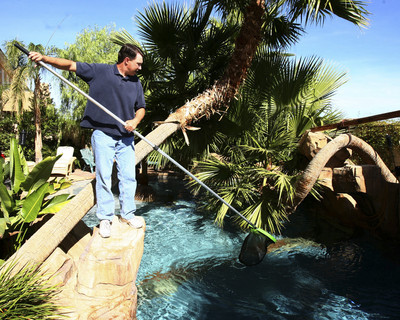WINTER WATERS
There are swimming pools in the Snow Belt and swimming pools in the Sun Belt. To properly winterize a pool in the Sun Belt, simply reduce the amount of chemicals you regularly feed the pool and consider reducing its daily filtration time. To properly winterize a pool in the Snow Belt ... well ... there are way too many steps so it's much easier just to move to the Sun Belt.
At Red Rock Pool & Spa, owner Chris Colasuono's philosophy is to maintain a pool regularly throughout the year.
"My theory is to be safe rather than sorry," said Colasuono. "Take chlorine for instance. During the summer, people add several tablets or more a week and then in the winter, cut back to every other week or once every three weeks. I suggest adding a tab or half a tab every week to properly maintain the pool and prevent algae that can still grow even in the winter. Pool owners will notice that when checking the pool via a chemical testing kit or if they take the water into a pool store to be tested, they'll notice that their chemicals are lasting longer. I just don't believe in cutting back on pool maintenance because, next to the home and car, a pool is a homeowner's most expensive investment."
According to Ken Christensen, author of "I Love My Pool," one of the most-asked questions is: "Should a Las Vegas pool be drained during the winter to cut down on maintenance, chemicals and water?"
The answer: "No," Christensen said. "I live in Florida and spend two months a year in Las Vegas visiting my father. We're fortunate in that we can use our pools throughout the year and even though you might not be physically using the pool, a properly maintained pool is always more visually appealing than one that is not kept in good condition.
"Another reason for year-round maintenance is that a nonworking system allows debris to gather. Leaves, dirt and other trash collect over the months and can stain the bottom of the pool and, besides, it makes for a large clean-up project when spring arrives. And keep in mind that the integrity of the interior of a pool can be jeopardized without the moisture from the water."
Christensen said he discovered while writing his book that there was no need for the mystique usually associated with taking care of a pool.
"It's not that complicated," he said. "I maintain mine for about $30 a month. It's really quite simple, even in winter."
Another reason Christensen encourages Southern Nevadans to maintain their pools during the fall and winter is because some of those fall and winter evenings are perfect for barbecues and parties. To make those parties a success, pool owners should take precautions to avoid burst pipes and other winter hazards.
"Most high-tech pool systems are equipped with remote controls including a freeze protection feature," said Joe Vassallo, a certified building professional and owner of Paragon Pools. "This mode automatically turns pool equipment on when weather reaches freezing temperatures. Settings are usually preset at the factory so check the owner's manual about your specific system. If you don't have a remote control system, there are several freeze protection devices that can be easily added for around $200-$300. A licensed pool service company can assist with proper installation."
And never forget about safety. According to Vassallo, who has been building pools in Southern Nevada for 20 years, there is a reasonable assumption in the pool industry that if a pool is covered by a solar blanket to warm the water, small children and animals do not recognize the potential danger of drowning because they don't see the water. And because of this, they sometimes try walking on it, which can be life threatening.
Though many pool owners use solar covers, Christensen is a strong proponent of Solar Sun Rings, 5-foot plastic rings that cover and heat the pool.
"It is all about safety," echoed Christensen. "If you fall into a pool with sun rings, you can manipulate around them as the magnets that interlock the individual rings separate and prevent entrapment."






















